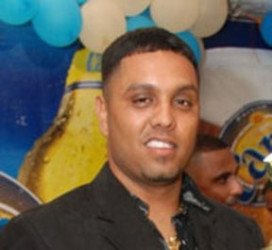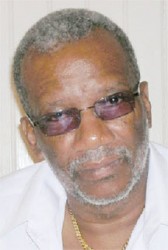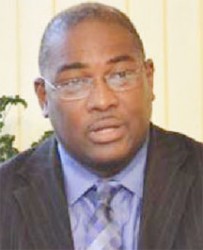It reads like a political confrontation between two parties, but those are the slogans the two contesting slates are proffering to win votes at Saturday’s Guyana Football Federation (GFF) executive elections.
![]() How about Team Resourceful? Surely that’s the quality the new president and his team need to have to build Guyana’s football to the next level of administrative respectability to match and even better the standard Jamaica and Trinidad and Tobago have set in the English speaking Caribbean.
How about Team Resourceful? Surely that’s the quality the new president and his team need to have to build Guyana’s football to the next level of administrative respectability to match and even better the standard Jamaica and Trinidad and Tobago have set in the English speaking Caribbean.
Of the two teams though, Nigel Hughes’s Team Unity seems the better of the two capable to begin that process as opposed to the Team Integrity slate of Wayne Forde and company.

If it is felt that Hughes lacks football administration experience, he makes up in the career accomplishments attained over the years.
In running a prominent law firm, Hughes has attained the much needed skills and influence needed to infuse the resources necessary to jerk Guyana’s football from the doldrums, of which the federation has lacked over the years.
Given Hughes’ exposure in his stated profession in law, in other business ventures and generally in getting things done for his Alliance for Change political party, he doesn’t necessarily need years of involvement in a local club, as his opponent Forde has.
A country’s football development starts with its domestic structure of which Guyana’s has seen little growth over the years from a collection of teams without substantial resources of assets to qualify as clubs ready for involvement in professional leagues.

One exception has been Alpha United and to a lesser extent Slingerz whose leaders happen to be on Hughes’ slate. Odinga Lumumba has almost singlehandedly made Alpha the best local team on and off the field for years now, while Javed Ali’s Slingerz is on track to follow suit.
It therefore follows that Guyana’s football needs a leader who understands its priorities, has the gravitas to attract substantial financing and create such as well, first and foremost.
As it is, no football body or sports organization can get better without adequate financial resources, simply because nothing much can be done without it. You cannot

develop players without money to compete in international competition which requires travel, accommodation and salary expenses. Neither can players develop without money to run domestic competitions at senior and junior levels, nor for training coaches and officials or establishing training academies.
The GFF under its previous elected leaders has fallen short on every one of those counts, with Presidents happy to be at the helm more for personal gain than anything else.
With his extensive resume accomplishments and pronouncements of his vision for the sport’s future, Hughes must be the better of the presidential candidates the GFF needs.
Forde has been a longstanding president of Conquerors, which with due respect to all involved, has been just another of the said “teams” that comprise the domestic landscape.
Has he managed to take Conquerors to the next level, like Lumumba has done in leading Alpha, which is capable of paying its players and formed decades after Conquerors, to many notable achievements including being the first Guyana team to qualify for the CONCACAF Champions League, and also landing numerous local titles?
There is no evidence to support such accomplishments by the Team Integrity leader.
Lumumba managed to muster the money and other requirements to build “The Hammer” from nothing to the local giants they are today which is the type of resourceful personnel the GFF needs.
If one is to compare the leadership of the Normalization Committee’s Chairman Clinton Urling and the previous elected GFF president Christopher Matthias, the results might paint the scenario that could play out in the future.
Matthias, a longstanding administrator in teams and the Georgetown Football Association, made a mess of his short term at the GFF’s helm, could not get anything done and had to be eventually ousted by world governing body FIFA, after a series of No-Confidence motions were made on him. His predecessor Colin Klass, an ex-president of Western Tigers team, was even worse and was also hounded out of the sport by FIFA.
Following Matthias’ removal, in stepped Urling, an individual without any association with domestic football, but with a profile of high level career exposure including business, similar to Hughes, and did a much better job. Urling’s leadership resulted in full strength national teams resuming international competition, a newly crafted constitution being adopted, acquired the venue for the soon to be FIFA funded training facility, which his predecessors wasted a decade in failing to achieve, among other accomplishments.
And if one is to be guided by history, attorneys have done yeoman service for Guyana’s sports administration over the years. The late Frederick Rampersaud as President of the old Guyana Boxing Board of Control, used his analytical and negotiating skills to secure important fights and recognition for the country’s professional pugilists that helped placed Guyana on the world map in the 1970’s. Rampersaud was also a Guyana Cricket Board president during the country’s heydays in regional competition at the time.
Justice Aubrey Bishop also used his experience in the field to boost this country’s profile in football and cricket.
He spearheaded Guyana’s campaign to secure FIFA affiliation also in the 1970’s and reached heights in cricket administration that culminated in him being made a member of the panel appointed to determine West Indies player Marlon Samuels’ fate in the match fixing probe.
For the record he was the only member who voted against the player being banned, while others like the soon to be ousted team manager and former captain Richie Richardson, voted otherwise without any credible evidence.
If history is to be repeated, it will be for the good of the sport most needing it.
Hughes should be a shoo-in, for Guyana’s next football president.








